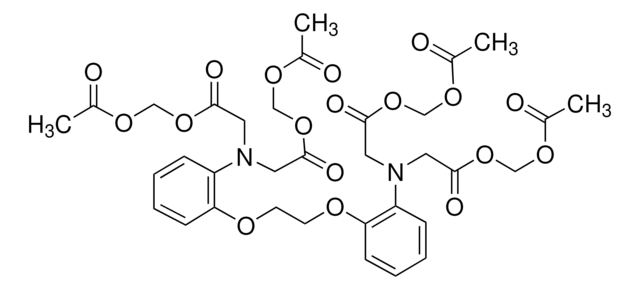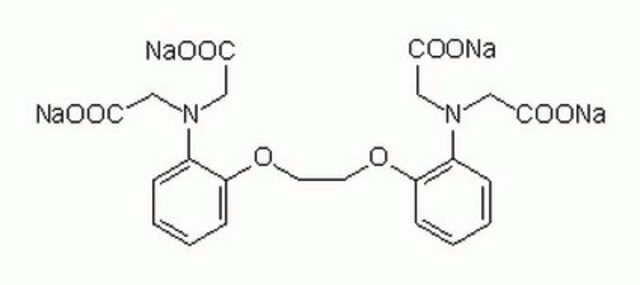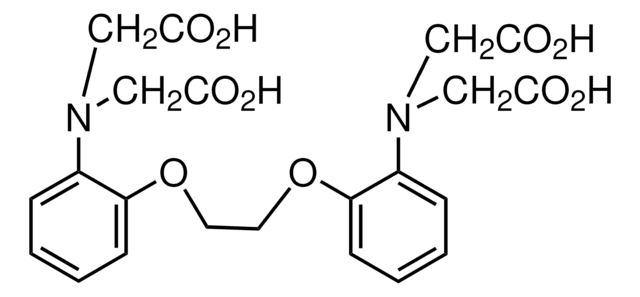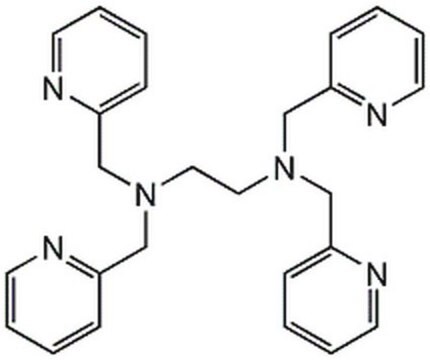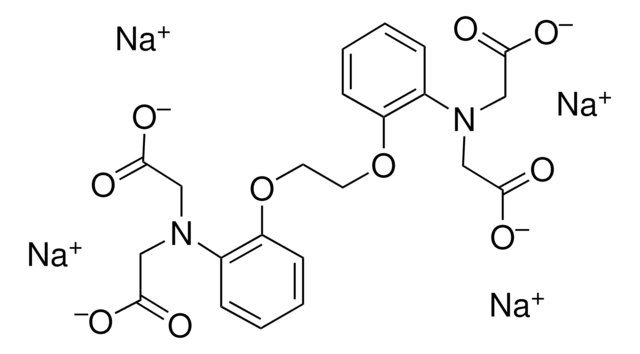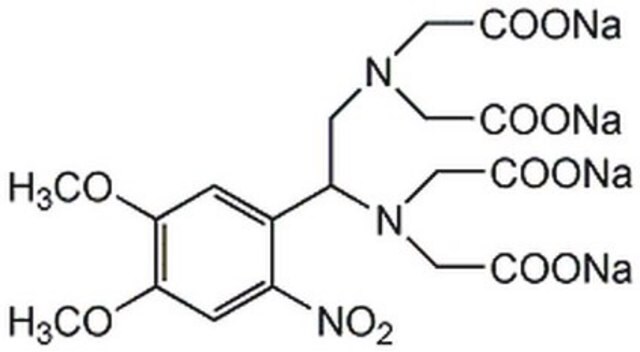196419
BAPTA/AM
Membrane-permeable form of BAPTA.
Synonym(s):
BAPTA/AM, 1,2- bis( o-Aminophenoxy)ethane-N,N,Nʹ,Nʹ-tetraacetic Acid Tetra(acetoxymethyl) Ester, 1,2-bis(o-Aminophenoxy)ethane-N,N,Nʹ,Nʹ-tetraacetic Acid Tetra(acetoxymethyl) Ester
About This Item
Recommended Products
Quality Level
Assay
≥90% (TLC)
form
solid
reaction suitability
reagent type: chelator
manufacturer/tradename
Calbiochem®
storage condition
OK to freeze
protect from light
color
light yellow
solubility
DMSO: 10 mg/mL
shipped in
ambient
storage temp.
−20°C
InChI
1S/C34H40N2O18/c1-23(37)47-19-51-31(41)15-35(16-32(42)52-20-48-24(2)38)27-9-5-7-11-29(27)45-13-14-46-30-12-8-6-10-28(30)36(17-33(43)53-21-49-25(3)39)18-34(44)54-22-50-26(4)40/h5-12H,13-22H2,1-4H3
InChI key
YJIYWYAMZFVECX-UHFFFAOYSA-N
General description
Application
- TRPV1-Dependent Antiproliferative Activity of Dioecious Maclura pomifera Extracts in Estrogen Receptor-Positive Breast Cancer Cell Lines Involves Multiple Apoptotic Pathways.: This study explores how BAPTA/AM, a calcium chelator, contributes to the antiproliferative effects by regulating TRPV1 and apoptotic pathways in breast cancer cells (Rumpa et al., 2024).
- Mitochondrial calcium uniporter promotes kidney aging in mice through inducing mitochondrial calcium-mediated renal tubular cell senescence.: The research highlights BAPTA/AM′s role in mitigating mitochondrial calcium overload, which is linked to cellular senescence and aging processes in renal cells (Xiong et al., 2024).
- TRPV3 facilitates lipolysis and attenuates diet-induced obesity via activation of the NRF2/FSP1 signaling axis.: This article discusses the role of BAPTA/AM in the modulation of TRPV3 channels, leading to enhanced lipolysis and protection against obesity through the NRF2/FSP1 pathway (Hu et al., 2024).
- Inflammation and Acinar Cell Dual-Targeting Nanomedicines for Synergistic Treatment of Acute Pancreatitis via Ca(2+) Homeostasis Regulation and Pancreas Autodigestion Inhibition.: BAPTA/AM is utilized to regulate calcium homeostasis, thereby preventing inflammation and autodigestion in acute pancreatitis treatments (Wang et al., 2024).
- IP(3)R-Mediated Calcium Release Promotes Ferroptotic Death in SH-SY5Y Neuroblastoma Cells.: This study investigates how BAPTA/AM inhibits IP3R-mediated calcium release, thereby reducing ferroptotic cell death in neuroblastoma cells (Campos et al., 2024).
Packaging
Warning
Reconstitution
Other Notes
Jiang, S., et al. 1994. Exp. Cell Res.212, 84.
Billman, G.E. 1993. Am. J. Physiol. 265, H1529.
Dieter, P., et al. 1993. Biol. Chem. Hoppe Seyler 374, 171.
Harrison, S.M., and Bers, D.M. 1987. Biochim. Biophys. Acta 925, 133.
Harrison, S.M., and Bers, D.M. 1987. J. Biophys.51, 102A.
Marban, E., et al. 1986. J. Clin. Invest.78, 1185.
Tsien, R.Y. 1981. Nature290, 527.
Tsien, R.Y. 1980. Biochemistry19, 2396.
Legal Information
Storage Class Code
11 - Combustible Solids
WGK
WGK 3
Flash Point(F)
Not applicable
Flash Point(C)
Not applicable
Certificates of Analysis (COA)
Search for Certificates of Analysis (COA) by entering the products Lot/Batch Number. Lot and Batch Numbers can be found on a product’s label following the words ‘Lot’ or ‘Batch’.
Already Own This Product?
Find documentation for the products that you have recently purchased in the Document Library.
Customers Also Viewed
Our team of scientists has experience in all areas of research including Life Science, Material Science, Chemical Synthesis, Chromatography, Analytical and many others.
Contact Technical Service